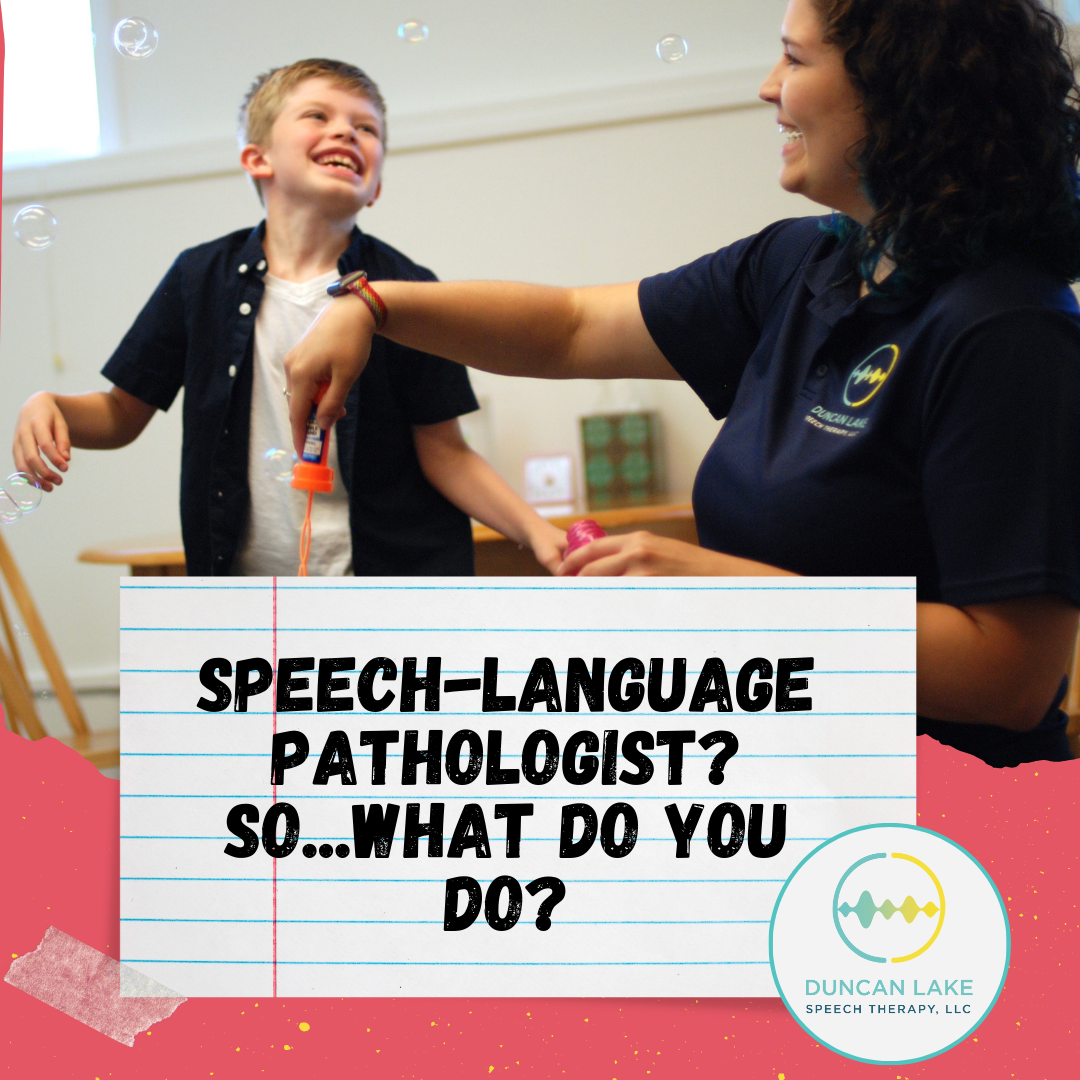by Tamiko Teshima, M.A, CCC-SLP
Practice Owner & Speech-Language Pathologist
Duncan Lake Speech Therapy, LLC
Originally published in May 2019, updated in April 2025
For weeks, I kept circling around what to write for my first blog post. I had a dozen ideas (some of which are still on the back burner…stay tuned!). But one night, as my husband and I were getting ready for bed, I was talking about something speech-related. Mid-conversation, I paused and asked, “Do you even know what I do?”
He said, “Yeah. You help kids speak better.”
I mean… kind of?
Here’s the thing: this man supported me through three years of grad school. He practically earned his M.A., CCC-SLP alongside me. And still, even he didn’t quite grasp the full scope of what speech-language pathologists actually do. Which made me think—if he doesn’t know, chances are a lot of other folks don’t either.
So let’s clear it up.

Settings: We’re Not Just in Schools
A lot of people picture SLPs as school staff—and yes, many of us are. But we work in a wide variety of places! According to the Bureau of Labor Statistics (2023):
- 40% work in educational services (state, local, and private schools)
- 24% work in private practices (offices of physical, occupational, and speech therapists, and audiologists)
- 15% work in hospitals (state, local, and private)
- 4% work in nursing and residential care facilities
- 3% are self-employed
And yes, some of us wear multiple hats and work across different settings at once. I’ve personally juggled both public school and private clinic roles. One of the best parts of this field? That kind of flexibility!
So… What Do We Actually Do?
Speech-language pathologists evaluate, diagnose, and treat communication and feeding/swallowing disorders across the lifespan. A classmate in grad school once said we “treat anything from the neck up,” and honestly? She wasn’t wrong.
Here are just a few of the areas we cover:
- Speech Sound Disorders: Helping people produce speech sounds clearly (think articulation, phonological disorders, and motor-based issues like apraxia).
- Fluency Disorders: Supporting people who stutter or experience other disruptions in the flow of speech.
- Voice Disorders: Treating issues likevocal nodules or chronic hoarseness. Yes, we care about your vocal folds!
- Language Disorders: Working with children and adults who struggle to understand or express themselves, whether through spoken or written language.
- Social Communication Disorders: Helping folks use language in socially appropriate ways—everything from reading nonverbal cues to taking conversational turns.
- Cognitive-Communication Disorders: Supporting memory, organization, problem-solving, and attention—often after brain injuries, strokes, or in conditions like ADHD or dementia.
- Feeding & Swallowing Disorders: Yes, we do this too! SLPs work with picky eating, dysphagia, NICU feeding challenges, and more.
- AAC (Augmentative & Alternative Communication): Providing tools and strategies (like speech-generating devices) for folks who communicate differently.
- Aural Rehabilitation: Helping individuals with hearing loss adapt and thrive.
- Gender-Affirming Voice Modification: Supporting transgender and nonbinary individuals in aligning their voice and communication with their identity.
And that’s just scratching the surface.
SLPs Are Specialists
Most of us specialize in a few key areas, and we’re pretty good at knowing when to refer out. If someone’s looking for support outside our wheelhouse, we connect them with another SLP who can help.
So… What Do We Really Do?
We support people of all ages, across all settings who want to connect, communicate, and feel understood. Whether it’s a toddler with a language delay, a teen navigating social interactions, an adult recovering from a stroke, or someone finding their voice in more ways than one… we’re here for it.



Recent Comments